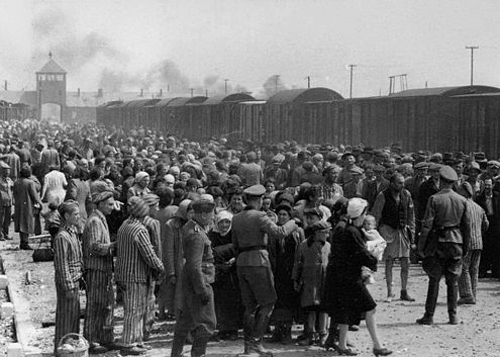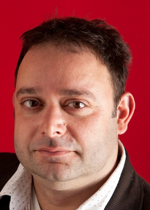
The Mufti and the Holocaust, revisited
By Ben Cohen/JNS.org

WASHINGTON, D.C. — “If a man was a Jew, it was good enough for him to be killed or stamped out,” wrote a senior British official serving abroad to his superiors in London in 1929.
From where was this gentleman—Major Alan Saunders—writing his dispatch? From Munich or Berlin or any of the other German cities where Hitler’s Nazi Party was gaining supporters and street thugs? In fact, no. Major Saunders was the head of the British Police in Palestine during the mandate period, and his statement concerned the massacre by Arabs, in August 1929, of 69 Jews in Hebron, a city where their community had been a continuous presence for at least two millenia.
I was reminded of Major Saunders’s pithy summary of the motive behind the Hebron pogrom when news broke of Israeli Prime Minister Benjamin Netanyahu’s speech to the World Zionist Congress in Jerusalem, in which he essentially argued that it was the Mufti of Jerusalem, Hajj Amin al-Husseini, who crystallized the idea of the mass extermination of the Jews in Adolf Hitler’s mind. But before I talk about the controversy that followed these comments, I want to make some more general observations by way of introduction.
The first is that, while Hitler unarguably remains the most powerful and devastating anti-Semite to ever hold state power, he was far from the only one at that time to approach the “Jewish question” in exterminationist terms. As Major Saunders related from faraway Palestine, about an episode that presaged the Nazi atrocities that were to follow in Germany and then in occupied Europe and North Africa, the same hatred of Jews simply for being Jews was in painful evidence there. For there were thousands, even millions, of ordinary people in Europe and the Middle East who regarded the Jews as a social and religious poison and wanted them—all of them—dead. In that sense, the Fuhrer was their representative and their master.
The second is that, as an Israeli Jew, Netanyahu is naturally sensitive to the Palestinian Arab dimension of the broader issue of collaboration with the Nazis, something I can relate to. As a kid, I remember sitting around my grandfather’s table with his relatives from Bosnia—men with sad eyes and the muscles and paunches of retired boxers, who had spent their youths in the Socialist-Zionist Hashomer Hatzair movement, graduating to fight with Marshal Tito’s communist partisans against the Nazi occupation of Yugoslavia that began in 1941. Men who, I realized with awe, had actually killed some of these Nazis that I’d seen in the movies.
And yet, when they spoke about the war, their anger really flowed when they remembered the locals who had assisted the Germans. Like Netanyahu now, what they found hardest to stomach was the spectacle of those non-Jews who lived alongside them collaborating with the Nazi extermination program.
In the pantheon of Nazi collaborators, Mufti Hajj Amin al-Husseini is right up there with Pavelic in Croatia, Petain in France, Horthy in Hungary, and all the other quislings—their name comes from the collaborationist leader in Norway, Vidkun Quisling—who implemented Hitler’s will. It was, ironically, the British authorities who appointed him to his position in 1921. During the 1929 massacre in Hebron, as during the openly anti-Semitic 1936-39 Arab revolt in Palestine, al-Husseini proved himself a confirmed Jew-hater and the natural ally of Hitler in the Arab and Muslim worlds.
It wasn’t until November 1941 that the Mufti met Hitler in person. Significantly, in the view of many historians, that encounter in Berlin took place two months before the Wannsee conference, where leading Nazis led by Hitler’s security chief, Reinhard Heydrich, plotted the implementation of the “Final Solution”—the extermination of the Jews.
In the official German record of their discussions (not an exact transcript, but a summary of what was said), it was clear that both Hitler and the Mufti were already in agreement that the Holocaust had to be visited upon the Jews. For his part, the Mufti expressed his appreciation of Germany’s commitment to the “elimination of the Jewish national home,” while Hitler restated his “active opposition to the Jewish national home in Palestine, which was nothing other than a center, in the form of a state, for the exercise of destructive influence by Jewish interests.”
For good measure, the Fuhrer added that “Germany was also aware that the assertion that the Jews were carrying out the functions of economic pioneers in Palestine was a lie. The work there was done only by the Arabs, not by the Jews”—a slander that could easily be expressed in the exact same words by the Boycott, Divestment and Sanctions (BDS) movement that targets the “Jewish national home” in our own time.
That last point highlights a critical factor which the furor around Netanyahu’s speech—much of it generated by visceral opponents of Israel who only talk about the Holocaust when it justifies their backing of Palestinian violence against Jews now—has largely missed.
During the 1930s, both Germany and Palestine were the sites of mob violence, boycotts, and discriminatory laws and regulations against Jews. The Nazi consolidation of power in the 1930s was what enabled them to launch their campaign of war and genocide at the end of that decade.
Had Palestine been conquered by the Germans from the British, there is no doubt that the Mufti would have been installed as the local quisling, and that the entire Jewish population would have been shipped to concentration and death camps in Europe—assuming that the Germans and their Arab militias didn’t build similar camps in the vicinity, of course. That was the mutual vision expressed in Berlin in 1941, the distinctly Arab contribution to the achievement of the “Thousand Year Reich.”
As the German historian Matthias Kuentzel has noted, the 700,000 Jews in the Middle East were in Hitler’s sights when he received the Mufti.
“As Hitler envisaged it, after the assault on the Soviet Union, the Wehrmacht would also occupy the Caucasus and so open the way to the Middle East…Part of this scenario was the killing of the Jews,” Kuentzel writes. Even though this grand ambition failed, the Mufti was still able, as the prominent Israeli Holocaust historian Yehuda Bauer put it, to be “an active partner in devising the Final Solution.” The Mufti also played a role in its implementation, raising three SS divisions composed of Bosnian and Albanian Muslims in the western Balkans.
Nor did the Mufti forget Palestine. The Israeli scholar Edy Cohen has revealed how, in May 1943, he blocked a deal agreed to by the British and the Germans to allow 4,000 Jewish children to enter Palestine in exchange for 20,000 German prisoners of war, while in 1944, he parachuted a terror cell into Tel Aviv with the intention of poisoning the local water supply.
The Mufti, disgracefully, escaped the Nuremburg Trials of Nazi war criminals and ended his days in Beirut in 1974. His legacy survives in the daily incitement against Jews that emanates from Palestinian official and social media. So, when considering the latest Netanyahu controversy, please remember this: Those Holocaust scholars who criticized Netanyahu’s speech nonetheless recognize the fundamental, bitter fact of Palestinian anti-Semitism and the Mufti’s position in fomenting it. It is the Palestinian leadership and their supporters—who have neither offered an apology nor reparations for the Mufti’s crimes against the Jews—who don’t.
*
Ben Cohen, senior editor of TheTower.org & The Tower Magazine, writes a weekly column for JNS.org on Jewish affairs and Middle Eastern politics. His writings have been published in Commentary, the New York Post, Haaretz, The Wall Street Journal, and many other publications. He is the author of “Some of My Best Friends: A Journey Through Twenty-First Century Antisemitism” (Edition Critic, 2014).
Articles from JNS. org appear on San Diego Jewish World through the generosity of Dr. Bob and Mao Shillman.